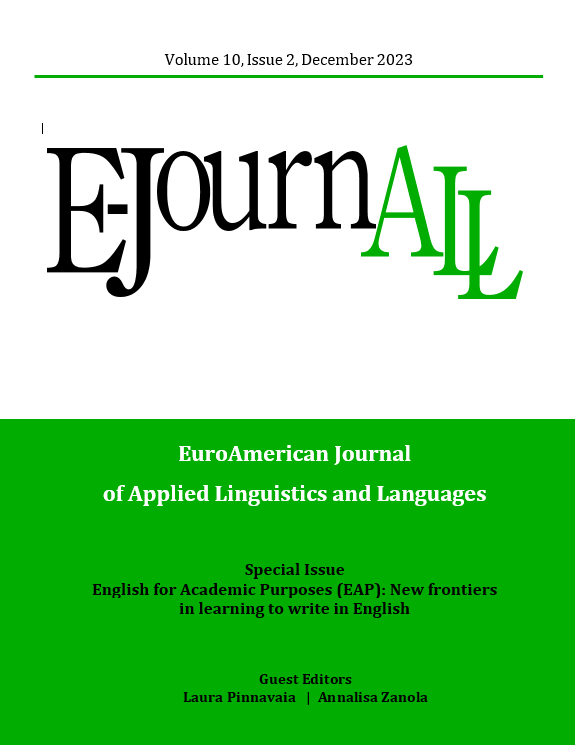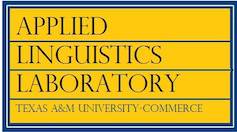From learner corpus to data-driven learning (DDL) in EAP writing. Improving lexical usage in academic writing
DOI:
https://doi.org/10.21283/2376905X.1.10.2.2748Keywords:
learner corpora, data-driven learning, English for Specific Academic Purposes (ESAP), collocation, Academic lexis analysisAbstract
Despite considerable discussion in the literature (Flowerdew & Peacock, 2001; Hyland, 1998; Tang, 2012) competent English academic writing is still a problem which needs to be solved. English for Academic Purposes (EAP) teaching often focuses on specialized lexis, which may, however, be the area where academic writers need least help. The study of a small corpus of C2 level academic writing which consisted of the sub-genres of summary and discussion writing revealed that one key area which is problematic is collocation. This paper presents the results of this small corpus investigation into learner language and how it informed the classroom implementation of data-driven learning (DDL) to increase learner awareness of and ability to use collocations effectively in written academic English. The article briefly describes the corpus and the resulting teaching procedure adopted. The first step of this procedure is familiarization followed by experimentation using Sketch Engine (SkeLL).
References
Ahearn, Laura M. (2001). Language and agency. Annual Review of Anthropology, 30, 109–137. https://doi.org/10.1146/annurev.anthro.30.1.109
Bahns, Jens, & Eldaw, Moira (1993). Should we teach EFL students collocation? System, 21(1), 101–114. https://doi.org/10.1016/0346-251x(93)90010-e
Barnau, Anna, & Ferková, Nina (2022). Medical English for academic purposes: the impact of a new guide for postgraduates on developing specific communication skills. ICERI2022 Proceedings, 1, 1262–1267. https://doi.org/10.21125/ICERI.2022.0329
Basturkmen, Helen, & Wette, Rosemary (2016). English for academic purposes, In Graham Hall (Ed.), The Routledge Handbook of English Language Teaching (pp. 164–176). Routledge. https://doi.org/10.4324/9781315676203-15
Benson, Morton (1994). Lexical phrases and language teaching. In System 2, 406–408. https://doi.org/10.1016/0346-251X(94)90027-2
Benson, Phil (2007). State of the art article: Autonomy in language teaching and learning. Language Teaching, 40(1), 21–40. https://doi.org/10.1017/s0261444806003958
Biber, Douglas, Conrad, Susan, & Cortes, Viviana (2004). If you look at…: Lexical bundles in university teaching and textbooks. Applied Linguistics, 25(3), 371–405. https://doi.org/10.1093/applin/25.3.371
BNC Consortium (2007). The British National Corpus, XML Edition. Retrieved from http://hdl.handle.net/20.500.12024/2554
Bondi, Marina (2001). Small corpora and language variation Reflexivity across genres. In Mohsen Ghadessy, Alex Henry, & Robert L. Roseberry (Eds.), Small Corpus Studies and ELT. Theory and Practice (pp. 135–174). John Benjamins Publishing Company. https://doi.org/10.1075/scl.5.11bon
Boulton, Alex (2017). Data-driven learning and language pedagogy. In Steven Thorne & Stephen May (Eds.), Language, Education and Technology: Encyclopedia of Language and Education (pp. 1–15). Springer. https://doi.org/10.1007/978-3-319-02237-6_15
Bourdieu, Pierre (1984). Distinction: A Social Critique of the Judgment of Taste. (Richard Nice, Trans.). Routledge & Kegan Paul. (Original work published 1979). https://doi.org/10.1086/446595
Bruner, Jerome Seymour (1961). The act of discovery. Harvard Educational Review, 31, 21–32. https://doi.org/10.4324/9780203088609-13
Chen, Yu-Hua & Baker, Paul (2010). Lexical bundles in L1 and L2 academic writing. Language Learning & Technology, 14(2), 30–49. https://doi.org/ 10125/44213
Clarke, Victoria & Braun, Virginia (2014). Thematic analysis. In Michalos, Alex C., Encyclopedia of quality of life and well-being research (p. 283). Springer. https://doi.org/10.1007/978-94-007-0753-5_3470
Conzett, Jane. (2001). Integrating collocation into a reading and writing course. In Michael Lewis (Ed.), Teaching Collocation (2nd ed., pp. 70–86). LTP.
Council of Europe (2001). Common European Framework of Reference for Languages: Learning, Teaching, Assessment. Cambridge University Press. http://www.coe.int/lang-CEFR
Dagneaux, Estelle Denness, Sharon & Granger, Sylviane (1998). Computer-aided error analysis. System, 26(2), 163–174. https://doi.org/10.1016/S0346-251X(98)00001-3
Davies, Mark (2020). The Corpus of Contemporary American English (COCA). Retrieved from https://www.english-corpora.org/coca/.
Dörnyei, Zoltán (2007). Research methods in applied linguistics. Oxford University Press. https://doi.org/10.1017/s0272263110000094
Duff, Patricia & Byrnes, Heidi (2019). SLA Across Disciplinary Borders: Introduction to the Special Issue. Modern Language Journal, 103, 3–5. https://doi.org/10.1111/modl.12537
Durrant, Philip & Schmitt, Norbert (2009). To what extent do native and non-native writers make use of collocations?. IRAL – International Review of Applied Linguistics in Language Teaching, 47(2), 157–177. https://doi.org/10.1515/iral.2009.007
Ennis, Michael, & Mikel Petrie, Gina (2020). A response to disparate/desperate circumstances. In Michael Ennis & Gina Mikel Petrie (Eds.), Teaching English for tourism: bridging research and praxis (pp. 1–6). Routledge. https://doi.org/10.4324/9780429032141-101
Firth, John R. (1957). A synopsis of linguistic theory 1930-55. Studies in Linguistic Analysis (Special Volume of the Philological Society), 1952–59, 1–32. https://doi.org/10.1093/ref:odnb/33138
Flowerdew, John, & Peacock, Matthew (2001). Issues in EAP: A preliminary perspective. In John Flowerdew & Matthew Peacock (Eds.), Flowerdew and Peacock Research Perspectives on English for Academic Purposes (pp. 8–24). Cambridge University Press. https://doi.org/10.1017/cbo9781139524766.004
Flowerdew, Lynne (2015). Corpus-based research and pedagogy in EAP: From lexis to genre. Language Teaching, 48(1). https://doi.org/10.1017/S0261444813000037
Graddol, David (2006). English Next. British Council Research. British Council. https://www.teachingenglish.org.uk/sites/teacheng/files/pub_english_next.pdf
Granger, Sylviane, & Bestgen, Yves (2014). The use of collocations by intermediate vs. advanced non-native writers: A bigram-based study. International Review of Applied Linguistics in Language Teaching, 52(3), 229–252. https://doi.org/10.1515/iral-2014-0011
Granger, Sylviane, Swallow, Helen, & Thiewissen, Jennifer (2022). The Louvain Error Tagging Manual Version 2.0. Louvain-la-Neuve: Centre for English Corpus Linguistics/Université catholique de Louvain. https://www.researchgate.net/publication/360806408_The_Louvain_Error_Tagging_Manual_Version_20
Green, Jenny, Burrow, Maria, & Carvalho, Lucila (2020). Designing for transition: supporting teachers and students cope with emergency remote education. Postdigital Science and Education, 2(3), 906–922. https://doi.org/10.1007/s42438-020-00185-6
Halliday, Michael A. K. (1994). An introduction to functional grammar (2nd ed.). Arnold, Hodder Headline.
Hartle, Sharon (2020). A dove in flight: Agency in 21st century language learning. Humanising Language Teaching, 22(3). Retrieved from https://www.hltmag.co.uk/june2020/a-dove-in-flight
Hartle, Sharon & Cavalieri, Silvia (forthcoming). Challenges and opportunities in EAP: Teaching PhD presentation skills. In Brian R. Morrison, Carole MacDiarmid, Ide Haghi, & Anneli Williams (Eds.), Proceedings of the 2021 BALEAP conference: exploring pedagogical approaches in EAP teaching. Garnet Publishing.
Hartle, Sharon, Facchinetti, Roberta, & Franceschi, Valeria (2022). Teaching communication strategies for the workplace: A multimodal framework. Multimodal Communication, 11(1), 5–15. https://doi.org/10.1515/mc-2021-0005
Holec, Henri (1981). Autonomy in foreign language learning. Pergamon.
Holmes, Martin (n.d.). About Markin. Retrieved from http://www.cict.co.uk/markin/index.php
Hyland, Ken (2006). English for academic purposes. An advanced resource book. Routledge. https://doi.org/10.4324/9780203006603
Hyland, Ken (1998). Hedging in scientific research articles. John Benjamins Publishing Company. https://doi.org/10.1075/pbns.54
Hyland, Ken (2008). As can be seen: Lexical bundles and disciplinary variation. English for Specific Purposes, 27(1), 4–21. https://doi.org/10.1016/j.esp.2007.06.001
Hyland, Ken & Tse, Polly (2009). Academic Lexis and Disciplinary Practice: Corpus Evidence for Specificity. IJES 9 (2). Retrieved from https://revistas.um.es/ijes/article/view/90781
Jimènenz Catalán, Rosa María, & Fernandez Fontecha, Almudena (2019). Lexical Availability Output in L2 and L3 EFL Learners: Is There a Difference? English Language Teaching, 12(2), 77–87. https://doi.org/10.5539/elt.v12n2p77
Johns, Tim (1986). Micro-Concord: A Language Learner’s Research Tool. System, 14(2), 151–162. https://doi.org/10.1016/0346-251x(86)90004-7
Johns, Tim (1991). Should you be persuaded - two samples of data-driven learning materials. English Language Research Journal, 4, 1–16. http://www.lexically.net/wordsmith/corpus_linguistics_links/Tim Johns and DDL.pdf
Kilgarriff, Adam, Baisa, Vit, Bušta, Jan, Jakubíček, Miloš, Kovár, Vojtēch, Michelfeit, Jan, Rychly, Pavel, & Suchomel, Vit (2014). The Sketch Engine. Ten years on. Lexicography, 1(1), 7–36. https://doi.org/10.1007/s40607-014-0009-9
Kirkpatrick, Andy (2007). World Englishes. Cambridge University Press.
Koprowski, Mark (2005). Investigating the usefulness of lexical phrases in contemporary coursebooks. ELT Journal, 59(4), 322–332. https://doi.org/10.1093/elt/cci061
Kyle, Kristopher, & Crossley, Scott (2015). Automatically Assessing Lexical Sophistication: Indices, Tools, Findings, and Application. TESOL Quarterly, 49(4), 757–786. https://doi.org/10.1002/tesq.194
Larsen–Freeman, Diane (2019). On language learner agency: a complex dynamic systems theory perspective. Modern Language Journal, 103, 61–79. https://doi.org/10.1111/modl.12536
Lew, Robert, Frankenberg-Garcia, Ana, Rees, Geraint, Roberts, Jonathan C., Sharma, Nirwan, & Butcher Peter (2018). ColloCaid: A tool to help academic writers find the words they need. In Fanny Meunier, Julie Van de Vyver, Linda Bradley & Sylvie Thouësny (Eds.), CALL and complexity – short papers from EUROCALL 2019 (pp. 144-150). https://doi.org/10.14705/rpnet.2019.38.1000
Lewis, Michael (1993). The Lexical Approach: The State of ELT and a Way Forward. In Studies in Second Language Acquisition (Vol. 7). Language Teaching Publications.
Little, David (1991). Learner Autonomy 1 : Definitions, Issues and Problems Learner autonomy. In Research Gate. Authentik. Retrieved from https://www.researchgate.net/publication/259874253_Learner_Autonomy_1_Definitions_Issues_and_Problems
Littlewood, William (2014). Methodology for teaching ESP. In Vijay Bhatia & Stephen Bremner (Eds.), The Routledge Handbook of Language and Professional Communication (pp. 287–303). Routledge. https://doi.org/10.4324/9781315851686.ch19
Macis, Marijana, & Schmitt, Norbert (2017). The figurative and polysemous nature of collocations and their place in ELT. ELT Journal, 71(1), 50–59. https://doi.org/10.1093/elt/ccw044
McEnery, Tony, Brezina, Vaclav, Gablasova, Dana, & Banerjee, Jayanti (2019). Corpus linguistics, learner corpora and SLA. Annual Review of Applied Linguistics, 39, 74–92. https://doi.org/10.1017/s0267190519000096
Nation, Paul (2001). Learning vocabulary in another language. Cambridge University Press. https://doi.org/10.1017/s0008413100018260
Nation, I.S. Paul, & Waring, Rob (1997). Vocabulary size, text coverage and word lists. In Norbert Schmitt & Michael McCarthy (Eds.), Vocabulary: Description, Acquisition and Pedagogy (pp. 6–19). Cambridge University Press. Retrieved from https://www.lextutor.ca/research/nation_waring_97.html
Nattinger, James R., & DeCarrico, Jeanette S. (1992). Lexical phrases and language teaching. Oxford University Press.
Nesselhauf, Nadja (2003). The use of collocations by advanced learners of English and some implications for teaching. Applied Linguistics, 24(2), 223–242. https://doi.org/10.1093/applin/24.2.223
Norton, Bonny (2010). Identity, literacy & English language teaching. TESL Canada Journal 28 (1), 1-13. https://doi.org/10.18806/tesl.v28i1.1057
Norton, Bonny (2013). Identity and language learning: extending the conversation (2nd Edition). Multilingual Matters. https://doi.org/10.21832/9781783090563
O’Keefe, Anne, McCarthy, Michael, & Carter, Ronald (2007). From corpus to classroom. Cambridge University Press. https://doi.org/10.1017/cbo9780511497650
Prodromou, Luke (1996). Correspondence from Luke Prodromou. ELT Journal, 50(1), 88–89. https://doi.org/10.1093/elt/50.1.88
Shin, Dongkwang, & Nation, Paul (2008). Beyond single words: The most frequent collocations in spoken English. ELT Journal, 62(4), 339–348. https://doi.org/10.1093/elt/ccm091
Sinclair, John McH. (1991). Corpus, concordance, collocation. Oxford University Press.
Sinclair John McH. (2004). Introduction In John McH. Sinclair, (Ed.), How to Use Corpora in Language Teaching (pp. 1-10). John Benjamins Publishing Company. https://doi.org/10.1075/scl.12.02sin
Tang, Ramona (2012). The Issues and Challenges Facing ESL/EFL Academic Writers in Higher Education Contexts: An Overview. In Academic writing in a second or foreign language: issues and challenges facing ESL/EFL academic writers in higher education contexts (pp. 1–20). Continuum Publishing. https://doi.org/10.5040/9781472541543
Timmis, Ivor (2008). The lexical approach is dead: long live the lexical dimension! Modern English Teacher, 17(3), 5–10.
Van Lier, Leo (2008). Agency in the classroom. In Lantolf James P. & Poehner, Matthew (Eds.), Sociocultural theory and the teaching of second languages (pp. 163–186). Equinox. https://doi.org/10.1558/equinox.29307
Whittle, Clayton, Tiwari, Sonia, Yan, Shulong, & Williams, Jeff (2020). Emergency remote teaching environment: a conceptual framework for responsive online teaching in crises. Information and Learning Science. https://doi.org/10.1108/ILS-04-2020-0099
Widdowson, Henry G. (1991). The description and prescription of language. In J. Alatis (Ed.), Georgetown University Round Table on Languages and Linguistics (pp. 11–24). Georgetown University Press. https://onlinebooks.library.upenn.edu/webbin/book/lookupid?key=olbp67603
Downloads
Published
How to Cite
Issue
Section
Categories
License
Copyright (c) 2023 Sharon Hartle

This work is licensed under a Creative Commons Attribution 4.0 International License.


